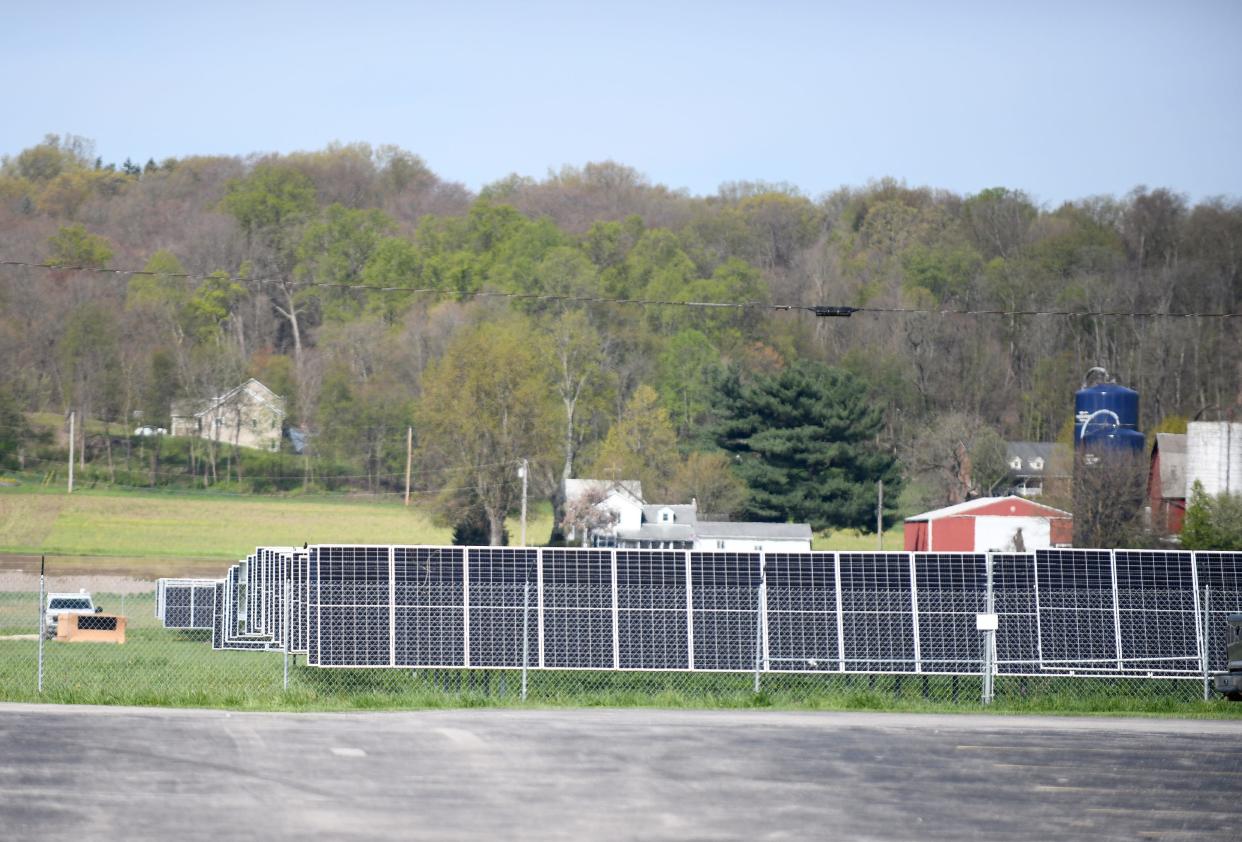Stark commissioners oppose Washington Twp. solar farm. What's that mean for project?

CANTON − Stark County commissioners voted Wednesday to oppose a major solar farm proposed in Washington Township, but that doesn’t mean the long-discussed $200 million project won’t move forward.
The 150-megawatt Samsung Stark Solar project — planned on more than 800 acres north of Louisville Street NE — has faced criticism from some residents and township trustees since it was first announced in 2021. Trustees passed a resolution against the project earlier this year.
County Commissioner Richard Regula said he could see a lot of benefits to the Stark Solar project, but he voted to oppose it because of the opinions of local residents and trustees.
"We rely on the township trustees," he said. "The trustees are the closest to the people and we want to respect their wishes and that's why we voted to oppose Stark Solar."
Samsung C&T Renewables, which is developing the solar farm, was disappointed in the commissioners' decision, but said in a statement that the company remains “deeply committed to educating the community about Stark Solar and working with residents and local stakeholders to design a project that benefits the community and generates home-grown, clean, low-cost energy.
“Samsung C&T Renewables looks forward to building a best-in-class utility-scale solar project in Washington Township, employing hundreds of local residents and generating $57 million in stable, long-term tax revenue for local services in Stark County, including nearly $35 million for Marlington Local Schools.”
The company also noted that it has worked hard to communicate to the community about the project, including hosting an open house that wasn't required, public meetings and meeting with school district and township leaders.
What does county opposition mean for the solar project?
Ohio Senate Bill 52, which was approved in 2021, gives local governments significant power during the siting process for large wind and solar projects, allowing counties to pass resolutions to oppose specific projects and designate restricted areas to prevent construction in portions of the county.
Additionally, two local representatives, one from the county and one from the township, can become ad hoc voting members on the Ohio Power Siting Board when it comes to approving or rejecting a project.
But the Stark Solar project in Washington Township is partially grandfathered under Senate Bill 52. Because of this, the commissioners' resolution will not immediately halt the solar farm. Instead, the resolution will be considered by the Siting Board when it makes its decision.
"We want to hear from the local government to gauge their point of view on these projects," board spokesman Matthew Butler said. "They'll take that into account before they arrive at their decision."
Any designated restricted area under the bill will also not apply to this project.
The local governments will, however, have the opportunity to be represented on the Siting Board as ad hoc members. Commissioner Janet Creighton was named as an ad hoc member last week. Washington Township may also appoint the president of the board of trustees, Wayne Wallace, as an ad hoc member.
The two local ad hoc members will join the seven permanent members on the Siting Board. Each member gets one vote and items need a simple majority to pass.
International Brotherhood of Electrical Workers criticizes commissioners
The International Brotherhood of Electrical Workers union criticized the commissioners’ decision.
"Let's call it what it is: an attack on over 700 hardworking families who rely on projects like Stark Solar for their livelihoods and financial stability,” IBEW Local 540 business manager Erik Hann said in a prepared statement.
He said the commissioners “with no defensible justification ... decided to throw away $200 million worth of investment into our community’s future.
“We refuse to sit back as our elected officials attempt to rob us of good union jobs and economic security. Our commissioners should be focused on mitigating any legitimate concerns they might perceive, not blindly dismissing critical infrastructure projects with so much benefit for our community.”
The majority of Stark County townships are opposed to large wind and solar farms in their communities, according to a survey conducted by the county commissioners.
Canton, Jackson, Lake, Lawrence, Lexington, Nimishillen, Osnaburg, Paris, Pike, Plain, Sugar Creek, Tuscarawas and Washington townships requested the commissioners vote to prohibit large solar facilities and large wind farms of 50 megawatts or more, as well as economically significant wind farms between five and 50 megawatts. Meanwhile, Marlboro Township asked to commissioners to prohibit large solar facilities and large wind farms but did not request action on economically significant wind farms.
What comes next for the Stark Solar project?
The Stark Solar project will proceed through the siting process.
The next step is to set a schedule for meetings, which will include dates for a local public hearing.
The Siting Board is still accepting public comments on the project, Butler said.
The application process takes about a year. If the project is approved by the Siting Board, construction on the solar farm is anticipated to begin in 2026.
If built, Stark Solar says the solar farm will generate $57 million in tax revenue for schools and local services in Stark County and electricity to power over 27,000 homes.
Reach Grace at 330-580-8364 or gspringer@gannett.com. Follow her on X @GraceSpringer16.
This article originally appeared on The Repository: Stark County commissioners oppose Stark Solar project

